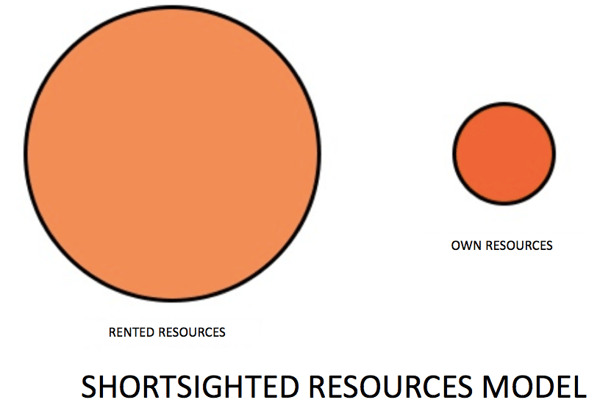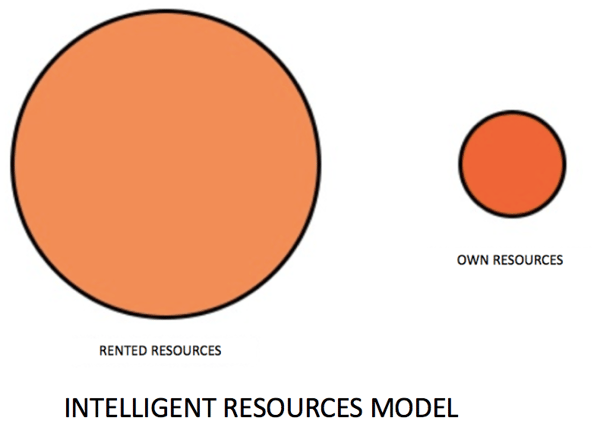There are 2 kinds of presence that you can have on the Internet: Your Website and Social Networks. To put it in simple words, the first one is a means of your property and the second ones are means that you rent.
On which of the following would you invest more?
- The house that you rent
- A house that you own

One of the main mistakes I see in digital strategies, is companies being present only in Social Networks. There is a series of clients who tell us: "we only want to do Facebook, we don't need anything on our website, it's fine as it is". This perception follows the boom that social networks had due to:
- their remarkable statistics with viral materials
- the number of users they have
- the billion dollar amounts at which these companies and their shares are bought and sold.
It is true that having presence in Social Networks can boost a digital strategy. But there are many reasons why it shouldn't be the only presence to consider.
Here are 4 reasons why ONLY carrying out a Social Networks strategy is a terrible idea:
Reason n.1- Organic Search
One of the main objectives of a Digital Strategy is attracting new visitors. Social Networks might have the effect of creating awareness about the existence of our company and our products and thus, attract more visitors, yet not everyone who sees your content on social networks have the urgent need of your services or products.
On the other hand, the content that is on your website is indexed (cataloged) by search engines, such as Google. These indexed results are called organic searches. In other words, your content gets placed in the global information index. So if someone looks for a product or service online, those contents that are on a website or on a blog will be the first ones to be shown, before those that are on social networks. This person who did an online search already has a need to solve a specific problem, since he is looking for specific services or products, which you happen to offer. In social networks this isn't necessarily the case; people use them to entertain, inform or educate themselves.
We hardly ever look up for something in a social network. What's more, the search algorithms of most social networks such as Facebook, are very bad. We want to look for something and odds are we'll hardly find it.
Reason n.2- Copyright
Did you know that everything that you post on Facebook in theory belongs to Facebook? Of course, if it's the first time you publish it. If you have published it before somewhere else, you overcome this rule. So if you only post on Facebook and someday you want to retrieve your material and publish it elsewhere, there is a possibility that you can not legally do so. Just imagine throwing all the efforts you've made on generating content away, giving it freely to someone else.
Reason n.3- DataBase
Social Networks live on you hiring advertising services with them. In other words, they own the user database of your own fan page. If you want to contact one of your followers with a personalized message, what do you think will happen? It'll cost you. If Social Networks gave you the list of people who sympathize with your brand, if they gave you their name and email address, well, they would run out of business, wouldn't they?
Instead, with an Inbound Marketing strategy, you get to know who entered your website and got involved with your content. This is what we call loop marketing.
Reason n.4- ROI
Content is the main reason why people follow a brand or the way they seek to solve a problem by learning more with these contents. Generating them is an investment that will be returned with visitors and prospects. Therefore, content must be shared in all the web and in social networks as well; it shouldn't only belong to a single medium.
Wrapping things up, Best strategy= Own+Rental

That's why in Inbound Marketing, a common practice is to publish that content in our blog first and then share it in the Social Networks. Just like in traditional marketing campaigns we shared the same message on different medium with an specific adaptation to each of them (we made a jingle for the radio, a commercial for TV and, for printed media, we printed the same message with a photo and texts), good content should be spread on social networks with their own formats: on Twitter with 140 characters, and on Pinterest with a very attractive image.
The best way to go is thus, to have a presence in both media. Obviously investing more in your own resources than in those that you rent, such as your blog, your Website, your applications. These are tools with which we can customize the experience that each user has, knowing their tastes and preferences.
An Inbound Strategy tries to reach people on Social Networks so that they come to your Website and turn them into prospects, that is, have a direct contact with them using their name and email address (without the need to pay to communicate with our followers). Think about it, what do you prefer? A follower or a prospect/potential customer?
So if you happen to be thinking about only working with Facebook, stop and think a little more about it. If you have any questions feel free to contact us, we'd be glad to tell you how an Inbound Marketing digital strategy is carried out.
(Blog based in some of Avinash Kaushik ideas)

